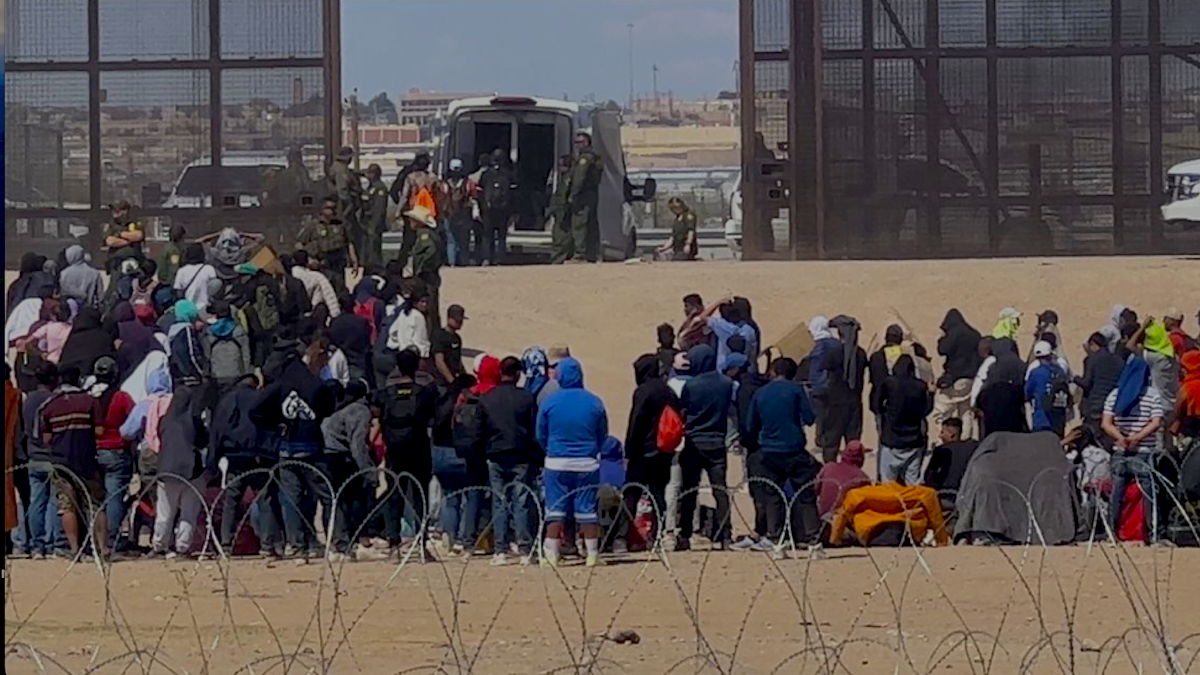President Biden has finally found a solution to address the surge in illegal crossings at the southern border: tell the tens of thousands of aliens unlawfully entering the United States from Mexico that they can come to America “legally” if they instead fly to a port-of-entry in the interior of the country.
Seriously, for all the Biden administration’s spin, that’s his plan — and it is illegal.
Of course, when Biden announced his administration’s newest policy on Thursday in advance of his midterm inaugural trip to the southern border on Sunday, the press release heralded the plan as a “new border enforcement action.” But as National Review’s Andrew McCarthy exposed in his weekend column, it’s a scam.
The scam, though, is layers thick, both legally and politically. And to reach the core truth — that Biden refuses to faithfully execute his duties as the president of the United States by defending our sovereign border — one must first unpeel the specifics of the newest plan buried in the Department of Homeland Security’s official notice of the changes, while also analyzing the relevant immigration law.
The Plan
Today’s edition of the Federal Register, which serves as “the Daily Journal of the United States Government,” contains the details of DHS’s supposed “new border enforcement action,” in four separate “notices,” titled respectively: “Implementation of a Parole Process for Cubans,” “Implementation of a Parole Process for Haitians,” “Implementation of a Parole Process for Nicaraguans,” and “Implementation of Changes to the Parole Process for Venezuelans.”
Each notice summarizes the Biden administration’s supposed “solution” to the flooding of the southern border, which in short consists of allowing, on a monthly basis, a total of 30,000 aliens to enter the United States “legally” if they are Cuban, Haitian, Nicaraguan, or Venezuelan nationals. To qualify, aliens must have a “U.S.-based supporter,” which could be “non-governmental entities or community-based organizations,” and must “provide for their own commercial travel to an air [port-of-entry] and final U.S. destination.” National security and public safety vetting are also required, as well as any additional public health requirements, such as vaccinations.
But how is it that illegal-alien border crossers can become lawful noncitizens by just jumping through a few hoops and flying to the interior of the country, rather than sneaking over the southern border?
They can’t. And in crafting its latest immigration plan, the Biden administration is again acting lawlessly.
Biden’s Lawlessness
The Biden administration maintains it has the authority to allow aliens from Cuba, Haiti, Nicaragua, and Venezuela to enter the United States legally under section 212(d)(5)(A) of the Immigration and Nationality Act, or INA. That section provides the secretary of homeland security the authority to “parole” noncitizens “into the United States temporarily under such reasonable conditions as [the secretary] may prescribe only on a case-by-case basis for urgent humanitarian reasons or significant public benefit.”
“Parole” for purposes of the INA is a “legal fiction” in which “a paroled alien is physically allowed to enter the country,” but the alien maintains the same legal status as if he or she were held at the border waiting for an application for admission to be granted or denied. But besides obtaining the legal right to be present in the United States, an alien paroled into the United States may obtain employment authorization to work here lawfully.
As the Fifth Circuit Court of Appeals recently explained, “Parole began as an administrative invention that allowed aliens in certain circumstances to remain on U.S. soil without formal admission, with Congress codifying the practice when it initially enacted the Immigration and Nationality Act (the ‘INA’) in 1952.” At that time, Congress gave the attorney general “discretion to parole into the United States temporarily under such conditions as he may prescribe … any alien applying for admission to the United States.”
However, “throughout the mid-twentieth century, the executive branch on multiple occasions purported to use the parole power to bring in large groups of immigrants,” prompting Congress twice to amend the INA “to limit the scope of the parole power and prevent the executive branch from using it as a programmatic policy tool.” First, as the Fifth Circuit explained, in 1980, Congress added a requirement that the executive branch only parole refugees where “compelling reasons in the public interest with respect to that particular alien,” exist. Then, in 1996, Congress amended the INA to provide “parole may be granted ‘only on a case-by-case basis for urgent humanitarian reasons or significant public benefit.’”
While the DHS’s just-announced parole plans claim the department is making parole decisions on a case-by-case basis, the qualifications set forth by the DHS establish that the Biden administration is illegally using parole power “as a programmatic policy tool,” rather than as designed by Congress, for example, by “paroling aliens who do not qualify for an admission category but have an urgent need for medical care in the United States and paroling aliens who qualify for a visa but are waiting for it to become available.”
The Biden administration’s lawless use of its parole power should come as no surprise, though, as since November of 2021, the president’s team has relied on Section 212(d)(5)(A) to release “family units” at the border to supposedly deal with “capacity constraints.” Florida has challenged the Biden administration’s granting of such carte blanche parole, as well as the president’s failure to detain illegal aliens as mandated under the INA, and trial is set to begin on both those claims later today in a federal court in Florida.
The ‘Standing’ Problem
A similar legal challenge to the Biden administration’s recent parole plan seems likely, although by requiring applicants to secure a vetted “supporter” who will commit to providing for the parolees’ financial needs while they are present in the United States, it will be challenging for anyone to show “standing” to challenge DHS’s plan.
For instance, in the Florida case, while the Biden administration argued the state lacked “standing,” or the right to sue, the court rejected that argument, reasoning Florida “plausibly alleged that the challenged policies already have and will continue to cost it millions of dollars, including the cost of incarcerating criminal aliens and the cost of providing a variety of public benefits, including unemployment benefits, free public education, and emergency services to aliens who settle in Florida after being ‘paroled’ into the country.”
But other than providing “free public education,” the same types of monetary harms are lacking in the case of the Biden administration’s latest parole proposal. And it is questionable whether a court will find that providing free public education to children paroled under DHS’s plans will be enough to establish standing.
Absent a plaintiff with standing to challenge DHS’s plan to parole some 30,000 aliens into the United States every month, the only way to fight the Biden administration’s latest lawless move will be politically. Here, those seeking to secure the southern border have ample ammunition, including highlighting the fact that the Biden administration’s plan does nothing to address that portion of the 200,000-some individuals crossing the southern border every month that herald from countries other than Cuba, Haiti, Nicaragua, and Venezuela.
Further, while converting 30,000 illegal border crossers into parolees at ports of entry in the interior of the country may provide a reduction to the problem on paper, it does not secure the border nor promise any reduction in the number of individuals attempting to enter via Mexico.
The parole plan presumes, though, that there will be an even greater reduction in illegal border crossings than the 30,000 who enter as part of the parole process. The parole plan, according to the Biden administration, creates a disincentive for citizens of Cuba, Haiti, Nicaragua, and Venezuela to enter illegally at the southern border because the DHS’s new policy also provides that aliens who bypass the parole process and enter the United States without authorization will be subject to an expedited removal to Mexico or their country of origin.
If so, then why not just institute a policy of expediting the removal of individuals who enter illegally at the southern border?
Biden’s Border Disaster
According to the figures included in last week’s DHS notices, prior to the surge at the southern border that followed the Biden administration’s change in enforcement policies, there weren’t even 30,000 aliens from Cuba, Haiti, Nicaragua, and Venezuela crossing the border illegally on an annual basis.
For instance, the notice reported that for fiscal years 2019 and 2020 respectively, DHS encountered only 3,039 and 4,431 Haitian nationals at the southwest border, but by 2021 the number exploded to 43,484.
From 2014 to 2019, DHS encountered 589 Cubans on average every month, but by 2022, the average monthly encounter at the land border totaled 17,809, and in October and November of 2022, some 62,000-plus Cuban nationals attempted to cross the border.
From fiscal 2014 through 2019, border agents encountered a monthly average of 127 Venezuelan nationals, but by fiscal year 2022, the average number of Venezuelans crossing the border illegally on a monthly basis totaled 15,494 and rose to more than 33,000 in September of that year.
For Nicaraguan nationals, in 2022, DHS encountered an estimated 157,400 aliens, or an average of 13,113 per month, compared to an average of 316 per month from fiscal years 2014-2019.
These figures show the Biden administration does not need a parole policy: It needs an enforcement policy.
No End in Sight
There is a telling admission hidden in the DHS notice from last week that announced changes to the parole plan established for Venezuela in October of 2022. As originally established, the Venezuela plan capped the number of “parolees” at a total of 24,000 beneficiaries. But, as the DHS acknowledged in its notice modifying that plan, just two months in, “demand for the Venezuela process has far exceeded the 24,000 limit.”
“Absent immediate action,” the DHS notice explained, “there is a risk that DHS meets the 24,000 cap, which would in turn cause the [government of Mexico] to no longer accept the return of Venezuelan nationals and end the success of the parole process to date at reducing the number of Venezuelan nationals encountered at the border.” Further, should it reach the 24,000 limit, thereby making prospective migrants no longer eligible for parole, the “DHS anticipates that we would then see increased irregular migration of Venezuelans.”
In other words, the Biden administration is allowing aliens to come to America “legally” because if it doesn’t, foreign nationals will just start crossing the border illegally again.
Further, while the Biden administration’s current plan caps the number of parolees at 30,000 per month, the DHS notices indicate it may revisit that figure if necessary. What then, is there to stop the Biden administration from increasing the 30,000 cap two-fold or ten-fold? Or what is there to prevent the administration from expanding parole to aliens from countries beyond the four — maybe 14, or even 40?
While the intricacies of immigration law are detailed and often convoluted, the bottom line of the Biden administration’s parole plan should be clear to all Americans: Joe Biden has no intention of securing our border or faithfully executing his duties as the president of the United States.









